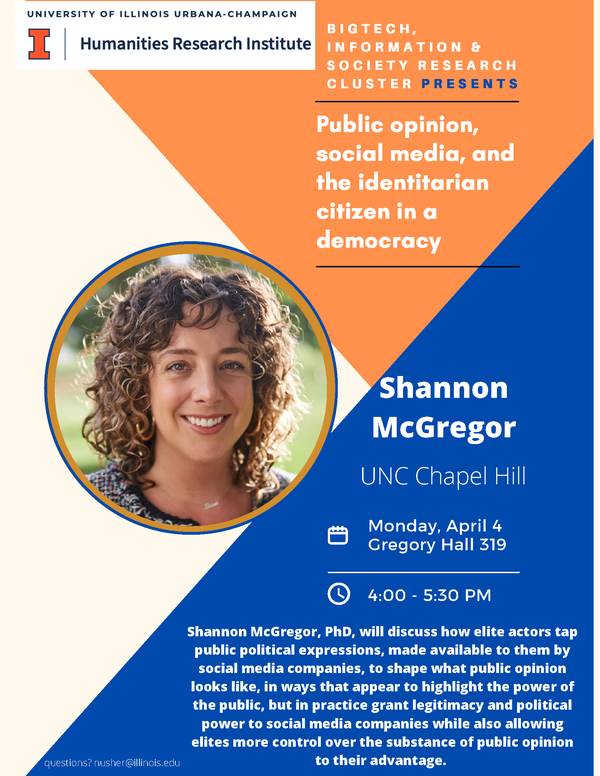
Public opinion, social media, and the identitarian citizen in a democracy
- Event Type
- Lecture
- Sponsor
- HRI's Big Tech, Information, and Society Research Cluster
- Location
- Gregory Hall, 319
- Date
- Apr 4, 2022 4:00 pm
- Speaker
- Shannon McGregor, PhD, UNC Hussman School of Journalism and Media
- Contact
- Nikki Usher
- nusher@illinois.edu
- Views
- 68
Shannon McGregor, PhD will present on several studies about the use of social media to understand public opinion. She reveals how journalists’ well-documented reliance on social media impacts their perceptions of and reporting about public opinion. Despite the mismatch between Google searches, tweets, and any national public, journalists use online posts and metrics as public opinion in their reporting. McGregor document how political campaign professionals turn to social media to understand the public, charting important implications for the practice of campaigning as well as the study of public opinion itself.
Elite actors tap public political expressions, made available to them by social media companies, to shape what public opinion looks like, in ways that appear to highlight the power of the public, but in practice grant legitimacy and political power to social media companies while also allowing elites more control over the substance of public opinion to their advantage.
Much of what we express on social media are performances of our identity just as much of what political actors attempt to communicate and activate are political identities. McGregor ends by discussing what an identitarian citizen means for democracy.
Bio: Shannon McGregor is an Assistant Professor in the UNC Hussman School of Journalism and Media. Her research addresses the role of social media and their data in political processes, with a focus on political communication, journalism, public opinion, and gender. McGregor’s published work examines how three groups – political actors, the press, and the public – use social media in regards to politics, how that social media use impacts their behavior, and how the policies and actions of social media companies in turn impacts political communication on their platforms. Her work takes up diverse methodologies like surveys, experiments, and large-scale computational and network analysis, as well as qualitative methods like in-depth interviews, to understand politics in socially networked digital spaces. McGregor’s work has been published in top journals like the Journal of Communication, New Media & Society, Political Communication, Journalism, and Information, Communication & Society, and she is the co-editor a book (with Dr. Talia Stroud), Digital Discussions: How Big Data Informs Political Communication.